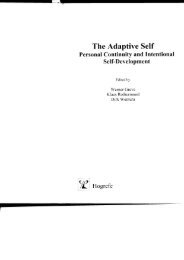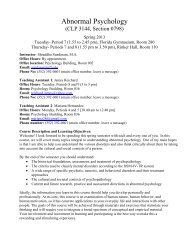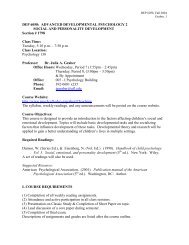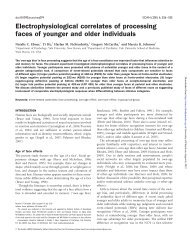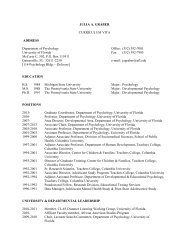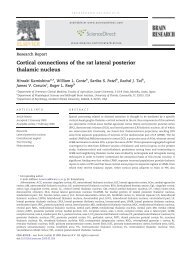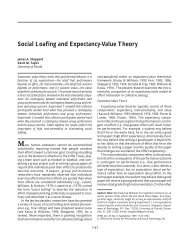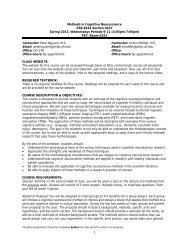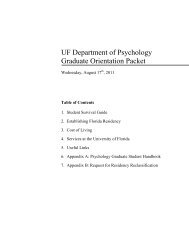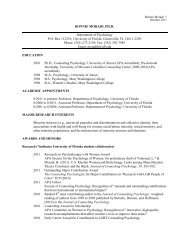Personality theories of successful aging - University of Florida ...
Personality theories of successful aging - University of Florida ...
Personality theories of successful aging - University of Florida ...
You also want an ePaper? Increase the reach of your titles
YUMPU automatically turns print PDFs into web optimized ePapers that Google loves.
<strong>Personality</strong> Theories <strong>of</strong> Strccessful Aging 107<br />
'failure and maintains<br />
s should be employed<br />
l. However, OPS theory<br />
that bring about adap-<br />
,ith developmental opides<br />
empirical support<br />
:ONDARY<br />
998) observed that the<br />
Llthood. Unexpectedly,<br />
'ositive age trend. Posi-<br />
:s and self-esteem sup-<br />
:rategies for adaptive<br />
that diseng<strong>aging</strong> from<br />
ve domains (i.e., comvant<br />
resources decline<br />
ess favorable. The auly<br />
committed or sepalger<br />
separated adults<br />
mary control strivings<br />
ts reported more seclngaged<br />
from partneraldomains.<br />
Moreover,<br />
ect over a time period<br />
Lip goals, whereas for<br />
l. One explanation is<br />
t late middle age comrtunities<br />
for attaining<br />
tce and functional imsupporting<br />
the notion<br />
ls in accordance with<br />
mental regulation be-<br />
Younger and middleith<br />
regard to various<br />
ral attainment versus<br />
ng the developmental<br />
<strong>of</strong> bearing a child. In<br />
from the goal. These<br />
nominated as well as<br />
rmen who had passed<br />
:ill more salient were<br />
ss to information relregative<br />
implications<br />
Taken together, the f indings in the context <strong>of</strong> OPS theory provide evidence that<br />
the endorsement <strong>of</strong> control strategies favors <strong>successful</strong> <strong>aging</strong> as they help to balance<br />
developmental gains and losses. Specifically, the use <strong>of</strong> compensatory control<br />
strategies increases in importance with positive effects on well-being and<br />
adaptive developmental regulation when goal-related resources are lost or become<br />
increasingly threatened, as is <strong>of</strong>ten the case in late adulthood. As is true for<br />
the SOC model and the dual-process model <strong>of</strong> coping, the OPS model supports<br />
the fruitfulness <strong>of</strong> approaching <strong>successful</strong> <strong>aging</strong> by investigating personalityin-context<br />
in terms <strong>of</strong> personal goals and goal-related processes. In the next and<br />
final section, we address this brief Iy.<br />
SUMMARY, FUTURE OUTLOOK, AND<br />
PRACTICAL RELEVANCE<br />
This chapter combined an action-theoretical with a life span-developmental<br />
perspective on personality and <strong>successful</strong> <strong>aging</strong>. This integration allows an understanding<br />
<strong>of</strong> goals as dynamic aspects <strong>of</strong> personality that reflect the personenvironment<br />
interaction over time. All three theoretical frameworks presented<br />
in this chapter (the SOC model, the dual-process model <strong>of</strong> coping, and the OPS<br />
model) argue that individuals can actively shape their development through the<br />
motivating, organizinp;, and directing functions <strong>of</strong> personal goals and goalrelated<br />
processes, and they all empirically support the role <strong>of</strong> goals and goalrelated<br />
processes for adaptive development. Moreover, they all stress that the<br />
management <strong>of</strong> resource changes from a dominance <strong>of</strong> gains to increasing<br />
losses is a key to <strong>successful</strong> <strong>aging</strong>. They differ, however, with regard to the specific<br />
processes proposed to best serve the management <strong>of</strong> resources across<br />
adulthood. There exists good evidence supporting each <strong>of</strong> these models. As <strong>of</strong><br />
yet, no integ;ration or systematic comparison <strong>of</strong> the models has been attempted<br />
(Freund & Riediger, 2003; for exceptions, see Freund & Baltes, 2002a,2002b, for<br />
positive associations <strong>of</strong> SOC and assimilative and accommodative coping). We<br />
believe that it will be a fruitful next step in future research on <strong>successful</strong> <strong>aging</strong><br />
to close this gap.<br />
Another future research direction in this field should be to investigate the<br />
oractical relevance <strong>of</strong> the three models. As various studies have shown that workielated<br />
goals are most central for younger adults and goals related to health issues<br />
become most prominent in older adults (Nurmi, 1992; Rapkin & Fischer,<br />
1992), our practical examples and speculations about the role <strong>of</strong> goals and goalrelated<br />
processes for <strong>successful</strong> <strong>aging</strong> refer to the domains <strong>of</strong> health and work.<br />
Research has demonstrated that framing health messages in terms <strong>of</strong> gains<br />
and losses has a differential effect on health-related goal adoption and goal pursuit<br />
when implementing health programs in younger and older adults. Cainframed<br />
messages emphasize benefits gained (e.g., becoming more attractive<br />
through a regular physical workout), whereas loss-framed messages emphasize<br />
the avoidance <strong>of</strong> benefits lost (e.g., preventing weight gain through regular<br />
physical activity; Brendl, Higgins, & Lemm, 7995). When individuals perceive<br />
themselves as highly vulnerable to certain health risks, as is <strong>of</strong>ten the case in<br />
old age, loss-framed messages are more effective, whereas gain-framed messages<br />
become more effective when perceived vulnerability is low, as is typically



